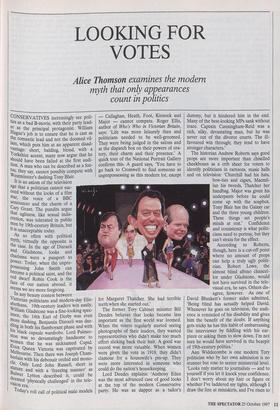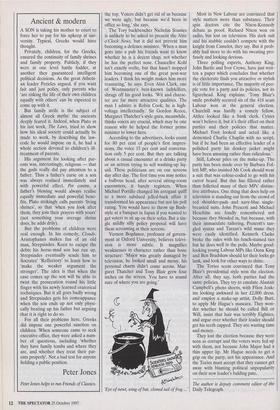LOOKING FOR VOTES
Alice Thomson examines the modern
myth that only appearances count in politics
CONSERVATIVES increasingly see poli- tics as a bad B-movie, with their party lead- er as the principal protagonist. William Hague's job is to ensure that he is cast as the romantic lead and not the doomed vil- lain, which puts him at an apparent disad- vantage: short, balding, blond, with a Yorkshire accent, many now argue that he should have been failed at the first audi- tion. A man who can be described as a foe- tus, they say, cannot possibly compete with Westminster's dashing Tony Blair. It is an axiom of the television age that a politician cannot suc- ceed without the looks of a film star, the voice of a BBC announcer and the charm of a Cary Grant. The pundits argue that ugliness, like sexual indis- cretion, was tolerated in public Men by 19th-century Britain, but A is unacceptable today. As so often with political myth, virtually the opposite is the case. In the age of Disraeli and Gladstone, looks and Charisma were a passport to Power. Today, when the unpre- possessing John Smith can become a political saint, and the red dwarf Robin Cook is the face of our nation abroad, it seems we are more forgiving.
Victorian any beauty contest between Victorian any beauty contest between victorian politicians and modern-day Eliz- abethans, 19th-century leaders win easily. William Gladstone was a fine-looking spec- linen, the 14th Earl of Derby was even more dashing. Benjamin Disraeli was daz- zling in both his flamboyant phase and with his black capsule wardrobe. Lord Palmer- ston was so devastatingly handsome to women that he was nicknamed Cupid.
Melbourne. Queen Victoria was captivated by melbourne. Then there was Joseph Cham- berlain with his debonair orchid and mono- cle. Only Lord John Russell, short in stature and with a 'freezing manner' as Bulvier Lytton described it, could be deemed `physically challenged' in the tele- vision era. Today's roll call of political male models — Callaghan, Heath, Foot, Kinnock and Major — cannot compete. Roger Ellis, author of Who's Who in Victorian Britain, says: 'Life was more leisurely then and politicians needed to be well-groomed. They were being judged in the salons and at the dispatch box on their powers of ora- tory, their charm and their presence.' A quick tour of the National Portrait Gallery confirms this. A guard says, 'You have to go back to Cromwell to find someone as unprepossessing as this modern lot, except for Margaret Thatcher. She had terrible teeth when she started out.'
The former Tory Cabinet minister Bill Deedes believes that looks became less important as the first world war loomed. When the voters regularly started seeing photographs of their leaders, they wanted representatives who didn't make too much effort slicking back their hair. A good war record was more valuable. When women were given the vote in 1918, they didn't clamour for a housewife's pin-up. They were more interested in someone who could do the nation's housekeeping.
Lord Deedes explains: `Anthony Eden was the most advanced case of good looks at the top of the modern Conservative party. He was as dapper as a tailor's dummy, but it hindered him in the end. Many of the best-looking MPs sank without trace. Captain Cunningham-Reid was a rich, silky, devastating man, but he was never out of the divorce courts. The ill- favoured win through; they tend to have stronger characters.'
According to Roberts, though, here is a cut-off point where no amount of props can help a truly ugly politi- cian. Robert Lowe, the almost blind albino chancel- lor under Gladstone, would not have survived in the tele- visual era, he says. Others dis- agree, however. As one of David Blunkett's former aides admitted, `Being blind has actually helped David. Whenever he goes on television, the audi- ence is reminded of his disability and gives him the benefit of the doubt. If anything gets tricky he has this habit of embarrassing the interviewer by fiddling with his ear- piece or asking them to slow down. I'm not sure he would have survived in the bearpit of 19th-century politics.'
Ann Widdecombe is one modern Tory politician who by her own admission is no stunner but rose to senior ministerial level. `Looks only matter to journalists — and to yourself if you let it knock your confidence. I don't worry about my hair or figure or whether I've laddered my tights, although I draw the line at miniskirts, and I've risen to the top. Voters didn't get rid of us because we were ugly, but because we'd been in office so long,' she says.
The Tory backbencher Nicholas Soames is unlikely to be asked to present the Nine o'Clock News, but it did not prevent him becoming a defence minister. 'When a man goes into a pub his friends want to know whether he is a decent chap, not whether he has the perfect nose. Chancellor Kohl isn't exactly svelte, but that hasn't stopped him becoming one of the great post-war leaders. I think his weight makes him more reassuring,' he says. Even Alan Clark, one of Westminster's best-known ladykillers, shrugs off his good looks. Wit and charac- ter are far more attractive qualities. The man I admire is Robin Cook; he is high- voltage intellectually.' Sir Gordon Reece, Margaret Thatcher's style guru, meanwhile, thinks voices are crucial, which may be one reason why he helped the former prime minister to lower hers.
According to the advertisers, looks count for 80 per cent of people's first impres- sions, the voice 15 per cent and conversa- tion only 5 per cent. But they are talking about a casual encounter at a drinks party or an actress trying to sell washing-up liq- uid. These politicians are on our screens day after day. The first time you may notice a bulbous head; after several sitting-room encounters, it barely registers. When Michael Portillo changed his arrogant quiff to a more subdued jelled-back affair it transformed his appearance but not his poll rating. You would have to throw up Bush- style at a banquet in Japan if you wanted to get voters to sit up on their sofas. But a sin- gle mildly silly policy proposal will have them screaming at their screens.
Vernon Bogdanor, professor of govern- ment at Oxford University, believes televi- sion is more subtle. It magnifies weaknesses in character rather than bone structure: 'Major was greatly damaged by television, he looked small and messy, his personal charm didn't come across. Mar- garet Thatcher and Tony Blair grew four inches on the screen. You have to sound sure of where you are going.'
`Eye of newt, wing of bat, cloned tail of frog ...' Most in New Labour are convinced that style matters more than substance. Their spin doctors cite the Nixon-Kennedy debate as proof. Richard Nixon won on radio, but lost on television. His dark suit and his stubble couldn't compete with the knight from Camelot, they say. But it prob- ably had more to do with his sweating pro- fusely and looking devious.
Three polling experts, Anthony King, John Bartle and Ivor Crewe, have just writ- ten a paper which concludes that whether the electorate finds you attractive or stylish is of little importance. The majority of peo- ple vote for a party and its policies, not its figurehead. King explains; 'Tony Blair's smile probably secured six of the 418 seats Labour won at the general election. Churchill was hardly a comely fellow, Attlee looked like a bank clerk. Cynics won't believe it, but it's their effect on their parties and their policies that matter. Michael Foot looked and acted like a demented Charlie Chaplin with no script, but if he had been an effective leader of a polished party his donkey jacket might have been amusing rather than ridiculous.'
Still, Labour piles on the make-up. The party has been made over by Barbara Fol- lett MP, who insisted Mr Cook should wear a suit that was colour-coded to go with his carrot beard. But this has filleted rather than folletted many of their MPs' distinc- tive attributes. One thing that does help on television is standing out from the crowd of red shoulder-pads and navy-blue single- breasted suits. John Prescott and Michael Heseltine are fondly remembered not because they blended in, but because, with their immaculate tailoring, Prescott's tan- gled syntax and Tarzan's wild mane they were easily identified. Kenneth Clarke broke the rules with his lunch-stained ties but he does well in the polls. Maybe good- looking young Labour MPs like Oona King and Ben Bradshaw should let their locks go lank, and look for other ways to shine.
The Tories seem convinced that Tony Blair's presidential style won the election. After all, they say, both parties had the same policies. They try to emulate Alastair Campbell's photo shoots, with Ffion Jenk- ins looking awkward in her £2,000 dress, and employ a make-up artist, Dolly Burt, to apply Mr Hague's mascara. They won- der whether he should be called Bill or Will, insist that hair was terribly Eighties, and argue over whether their leader should get his teeth capped. They are wasting time and money.
They lost the election because they were seen as corrupt and the voters were fed up with them, not because John Major had a thin upper lip. Mr Hague needs to get a grip on the party, not his appearance. And the Tories must accept that they cannot get away with blaming political unpopularity on their new leader's balding pate.
The author is deputy comment editor of the Daily Telegraph.



















































































 Previous page
Previous page